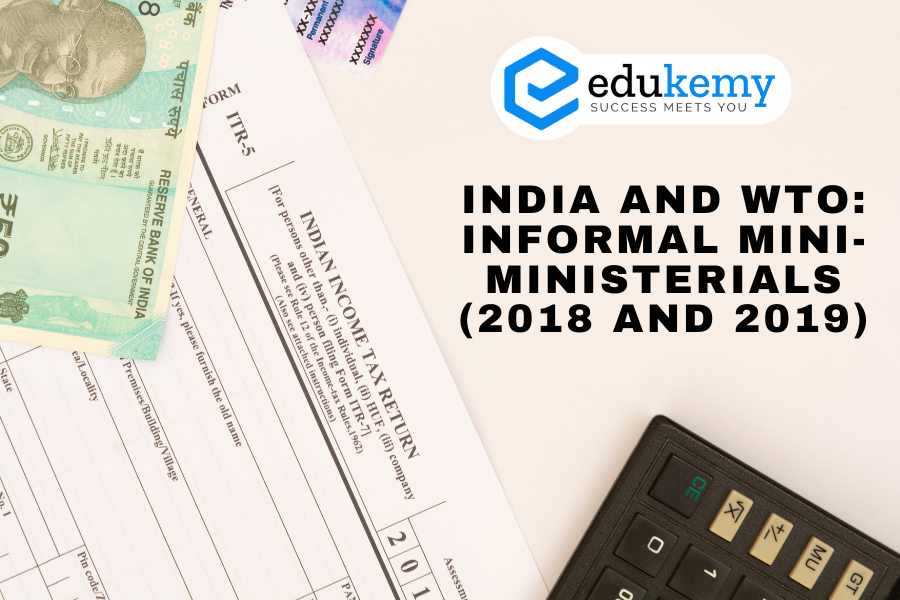
India played a crucial role in hosting two Informal WTO Ministerial Meetings in 2018 and 2019. These meetings served as platforms for discussions among developed and developing countries on various issues related to the multilateral trading system. The events brought together delegations from 52 countries, providing an opportunity to exchange views and address key concerns. Roberto Azevedo, the Director-General of the WTO, was among the participants.
Contents
- 1 Key Issues Discussed:
- 2 FAQs
- 2.1 1. What are Informal Mini-ministerials in the context of India and WTO?
- 2.2 2. Why did India participate in Informal Mini-ministerials in 2018 and 2019?
- 2.3 3. What were the key outcomes of India’s participation in the Informal Mini-ministerials?
- 2.4 4. How did India’s stance influence discussions during the Informal Mini-ministerials?
- 2.5 5. What are the implications of India’s engagement in Informal Mini-ministerials for future WTO negotiations?
- 3 In case you still have your doubts, contact us on 9811333901.
Key Issues Discussed:
- Dispute Settlement System:
- The breakdown of the dispute settlement system within the WTO was a prominent issue discussed in both the 2018 and 2019 meetings. The dispute settlement mechanism is a critical component of the WTO framework, and concerns were raised about its efficacy and functionality.
- Agriculture Trade-related Issues:
- Various agriculture-related issues were on the agenda, including concerns about public stockholding norms, Special Products (SP), and Special Safeguard Mechanisms (SSM). These issues are particularly relevant for developing countries seeking to address challenges in the agricultural sector.
- Protectionism and US Tariff Hikes:
- The issue of protectionism, particularly in the context of tariff hikes imposed by the United States, was discussed. Trade tensions between the US and China were highlighted as a significant concern affecting the global trading environment.
- Special and Differential (S&D) Treatment:
- Developing countries emphasized the importance of preserving and strengthening Special and Differential Treatment (S&D) benefits. There were concerns about potential reductions or limitations to these benefits, which are essential for addressing the developmental needs of less economically advanced nations.
- US-China Trade Tensions:
- The rising trade tensions between the United States and China were a focal point of discussions. The impact of these tensions on global trade dynamics and potential solutions were likely explored during the meetings.
- Future of Doha Round:
- The future of the Doha Round, which had been ongoing for an extended period without a conclusive agreement, was a subject of deliberation. Developing countries may have reiterated their positions and concerns regarding the round.
Outcomes and Implications: The informal mini-ministerials provided a forum for candid discussions on critical trade-related issues. India’s role as the host facilitated dialogue between diverse nations with varying economic interests. While the meetings may not have resulted in immediate solutions, they underscored the ongoing challenges within the WTO and the need for collaborative efforts to address them. The issues discussed reflected the evolving dynamics of international trade and the complexities associated with balancing the interests of developed and developing economies within the WTO framework.
FAQs
1. What are Informal Mini-ministerials in the context of India and WTO?
Informal Mini-ministerials are informal meetings held among select members of the World Trade Organization (WTO) to discuss pertinent issues without the formalities of a full ministerial conference. They serve as platforms for frank discussions and negotiations on key trade matters.
2. Why did India participate in Informal Mini-ministerials in 2018 and 2019?
India participated in these sessions to actively engage with other WTO members in addressing critical trade challenges, such as agricultural subsidies, e-commerce regulations, and the functioning of the dispute settlement mechanism. These meetings provided India with opportunities to voice its concerns and seek resolutions in a more focused and flexible environment.
3. What were the key outcomes of India’s participation in the Informal Mini-ministerials?
Key outcomes included renewed dialogue on WTO reforms, discussions on enhancing the multilateral trading system, and efforts to address concerns regarding the Appellate Body crisis. India emphasized the importance of inclusivity, transparency, and addressing the developmental concerns of developing nations within the WTO framework.
4. How did India’s stance influence discussions during the Informal Mini-ministerials?
India’s stance underscored the significance of safeguarding the interests of developing countries, particularly regarding agricultural subsidies and special and differential treatment provisions. India advocated for a balanced approach that prioritizes the developmental needs of emerging economies while fostering global trade liberalization.
5. What are the implications of India’s engagement in Informal Mini-ministerials for future WTO negotiations?
India’s active participation signals its commitment to multilateralism and collaborative problem-solving within the WTO. By contributing constructively to discussions, India aims to shape future negotiations in a manner that reflects the interests of developing nations and promotes equitable trade practices on the global stage.
In case you still have your doubts, contact us on 9811333901.
For UPSC Prelims Resources, Click here
For Daily Updates and Study Material:
Join our Telegram Channel – Edukemy for IAS
- 1. Learn through Videos – here
- 2. Be Exam Ready by Practicing Daily MCQs – here
- 3. Daily Newsletter – Get all your Current Affairs Covered – here
- 4. Mains Answer Writing Practice – here

